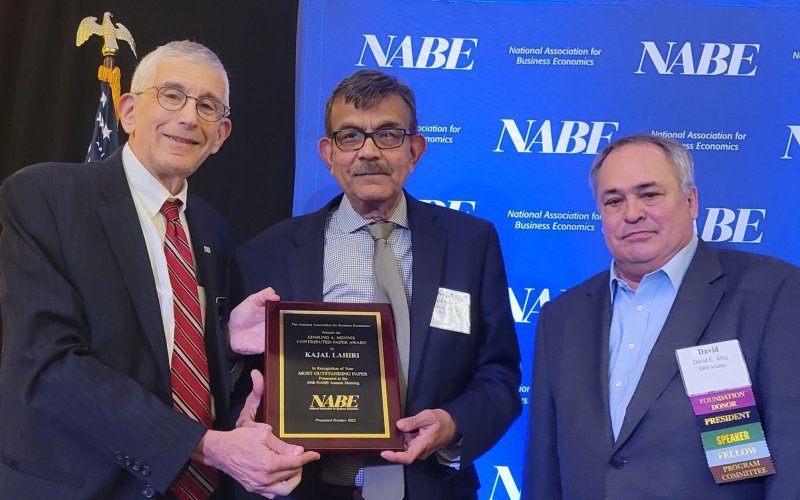Econ Professor Wins Prize for Paper Forecasting Recession

ALBANY, N.Y. (Nov. 8, 2022) — A recession forecasting paper written by Economics Professor Kajal Lahiri and former PhD student Cheng Yang won the prestigious Edmund A. Mennis Contributed Paper Award of the National Association of Business Economics (NABE).
The paper, “ROC Approach to Forecasting Recessions Using Daily Yield Spreads” found that there is an 80 percent likelihood of the United States entering recession in early 2023. Lahiri traveled to Chicago to present the paper and accept the prize at NABE’s annual meeting in early October.
An ROC approach refers to using “receiver operating characteristics,” which rely on big data inputs to chart probability. The system, originally developed for radar operators during World War II, is widely used in medical diagnostics, meteorology and machine learning. Lahiri used ROC to evaluate the historical trade-offs between false alarms and missed signals underlying recession predictors by using daily yield rate data from the Treasury Department.
Traditionally, financial analysts have watched the difference between long- and short-term interest rates as an indicator for recession. But many economists now think that certain factors — including unconventional monetary policies, financial innovations, deregulation, deepening of the commercial paper market, increasing globalization, structural breaks and inflation targeting by the Federal Reserve Board — make that model less reliable, Lahiri said, explaining the change to the ROC method.
Using the technique for this study, Lahiri and Yang determined “we can anticipate a recession to start during early 2023 with 80 percent probability.”
Yang, who graduated with his PhD in 2020 and is currently an assistant professor at Li Anmin Advanced Institute of Finance and Economics, Liaoning University in China, was unable to attend the meeting in Chicago. The paper was published online Nov. 5 and will be in print in the upcoming issue of NABE’s Business Economics journal.
NABE is the largest international association of applied economists, strategists, academics and policymakers committed to the application of economics, and conducts the Quarterly Business Outlook Surveys, a major source of national macroeconomic news.




